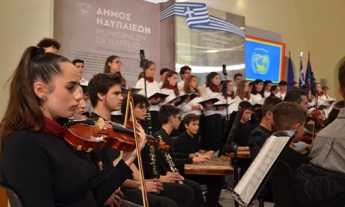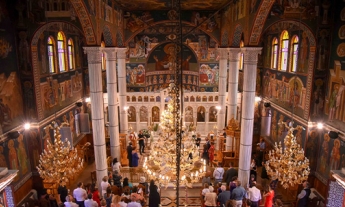If you have come on vacation to Nafplio during the summer and have not attended at least one local festival in the surrounding villages, you are missing out on a unique experience of fun and a connection with the customs and traditions of the region.
The famous festivals of Argolis are a once-in-a-lifetime experience that is worth living!
We often say that Nafplio, apart from being a uniquely picturesque town, also gives birth to and reproduces culture. And it is one hundred percent true. However, we usually associate culture only with art exhibitions, museums, theatrical performances, musical ensembles and concerts. For many years, we excluded from the realm of culture a precious part of Hellenism called "panigyri" (traditional folk festival), diminishing its value. Fortunately, the festivals in Argolis are going strong; they have returned vigorously in the post-Covid era and now constitute a strong core for the local community, as well as a distinct experience for both Greeks and foreign tourists.
What will you do and experience at a folk festival in Argolis?
There are three essential elements of a Greek folk festival: live traditional folk music, delicious spit-roasted meat (much often the famous "Gournopoula") and abundant beer. Around these three elements the entire celebration is built, and the success of each festival is based on them. These festivals are usually organized by the local cultural association and take place in the central square, the large courtyard of a school, or a specially arranged field.
Huge rows of tables are set up next to each other, dressed with oilproof paper tablecloths and surrounded by plastic chairs. Although "there's room for everyone," it's good to have a table reserved in your name for your family or group of friends if you want to be sure to find a place to sit.
Before you go to the "panigyri" (traditional folk festival), you will attend the Divine Liturgy and participate in the "artoklassia" (cutting of the blessed holy bread) and the procession of the icon of the celebrating Saint. Upon returning from the church (or coming from your home, if you don't have strong religious feelings), the first thing you should do before the musical program even begins, is to stand in line at the butcher's stall to get some "gournopoula" -that's how locals enjoy the roasted pork meat in Argolis!
Next, you will get beers, water, and soft drinks from the stall that sells them. They usually keep them in large basins or pitchers filled with ice, to preserve them cool. Alternatively, you can wait at your table for the seller to pass by, and you can buy them on the spot.
To further support the local cultural association, you will buy some lottery tickets -the prizes that are drawn are often rich and impressive. If you go with your children, they will surely find one or more toys at the selling stalls around, which they will probably want to buy.
The musical program always features a big star -the person who is always at the center of the hanged poster- surrounded by other singers or musicians. The talented clarinet player always wins the impressions and gets people dancing. At the folk festivals in Argolis, you will not only hear traditional local songs, but also popular folk songs from the islands, from Crete, from Epirus and, of course, authentic folk tunes and contemporary Greek hits.
As the beer flows abundantly and groups toast to their health, the excitement reaches its peak as the hours go by. A festival can last from 9 in the evening until early the next morning!
Get up and dance your favorite zeibekiko, with friends around you throwing napkins or flowers. Join the circle of other guests, who are all dancing together like one big group. Sing from your soul, clap your hands and applaud every time the live band gives its best performance.
After the dancing and singing, at some point, you'll feel hungry again. You'll grab some more "gournopoula" and savor some traditional "loukoumades" (fritters with honey), to gather strength and continue having an amazing time!
The key to enjoying the festival is to go with an open heart and the disposition to fully experience it! This evening will spread your appetite for future festivals and will infuse your vacation with a folkloric note of carefreeness, joy and authentic Greece.

Did you know that?
The word "panigyri" comes from the neuter form of the adjective "pas, pasa, pan" (which means all, whole) and the word "agyris" (which means gathering of people, market).
Greek festivals are a tradition with a long history and serve as means of expression of folk culture, connecting the past with the present and the future. However, they are not just a reason for celebration and entertainment, as their roots are directly connected to religious sentiments, as well as phases of agricultural, cattle-breeding or social life.
Where does the phrase "είμαστε για τα πανηγύρια" (meaning "we are going to the festivals") come from? During the time of the Romans, Corinth was an important commercial crossroad, and its currency traveled all over the world. As mentioned by the writer-journalist Takis Natsoulis in his book "Λέξεις και Φράσεις Παροιμιώδεις" (Proverbial Words and Phrases), Corinth held two festivals every year, each lasting for 1.5 months, attracting people who went there to sell and buy goods. Even when the Franks later arrived in Corinth, the festivals continued to thrive. So, when Greeks were asked where they were heading from different places, they would answer, "είμαστε για τα πανηγύρια" (we are going to the festivals)!
The festivals of June in Argolis:
In Agia Triada of Nafplio, in Akova of Argos and in Lygourio of Epidaurus -the Panigyri of Holy Trinity for Pentecost (June 4-5th 2023)
In Inachos of Argos -the Panigyri of Agia Efimia (June 10th 2023)
In Iria of Argolis (Municipality of Nafplio) -the Festival of Artichoke (Saturday, June 17th 2023) and the eve of Agios Konstantinos and Eleni (Saturday, May 20th 2023)
In Fragkaina village of Argolis -the Panigyri of the Holy Apostles Peter and Paul (Thursday, June 29, 2023)
The festivals of July in Argolis:
Neo Hereon and Kandia -the Panigyri of Agioi Anargyroi Kosmas and Damianos (July 1st 2023)
Koutsopodi, Lalouka, Argoliko and Frousiouna villages -the Panigyri of Agia Kyriaki (July 6-9th 2023)
Neo Roeino -the Panigyri of Agia Marina (July 16th 2023)
Prophet Elias Agios Adrianos -on the Eve of the saint's memorial day (July 19th 2023)
Fichtia village of Argos, Argolis -July 21st 2023
Poulakida Argolis -the Panigyri of Agia Paraskevi (July 25th 2023)
Adami village -the Panigyri of Agios Panteleimon (is held July 28th 2023)
Didyma village -July 29th 2023
The festivals of August in Argolis:
You will always find a Panigyri to attend to, for the celebration of "Panagia" (Assumption of the Virgin Mary, the Mother of God) around August 15th, while for the prefecture of Korinthia and Arcadia (with the highlight being the festival of Tegea), the dates have already been announced.
On the eve of "Panagia" (Assumption of the Virgin Mary), August 14-15th, you will find folk festivals in Aria of Nafplio and Assini, while in Assini, there is also a festival for the Transfiguration of the Savior, on August 6th 2023. Likewise, on Saturday, August 5th 2023, on the eve of the Savior's Day, the Cultural Association of Plataniti organizes a celebration in the Plataniti village of Nafplio (Reservations Tel: +30 698 563 8803).
Lastly, on Friday, August 25th 2023 in Drepano village, there is a folk festival for the religious celebration in honor of Saints Adrianos and Natalia, which gathers many people from the surrounding villages. Starting time: 22:30. Reservations: T. +30 697 721 8000.











